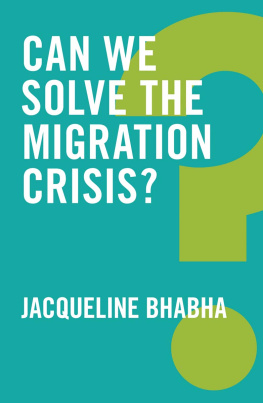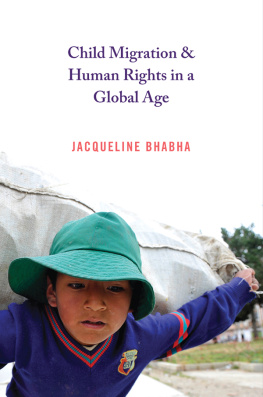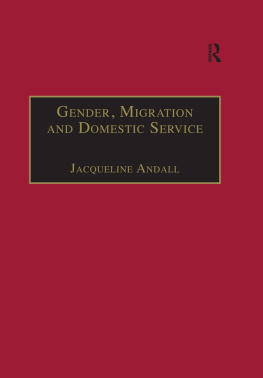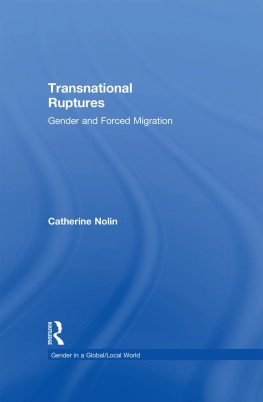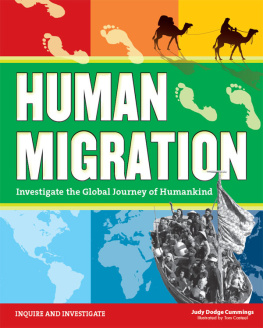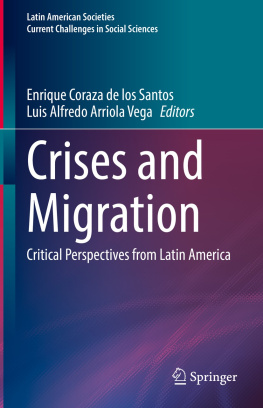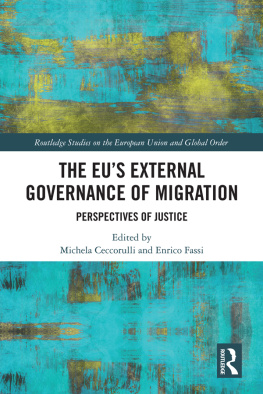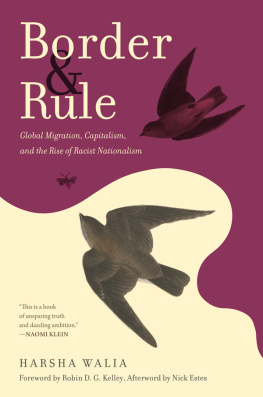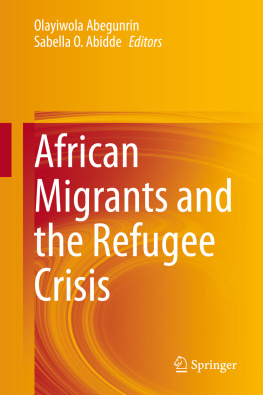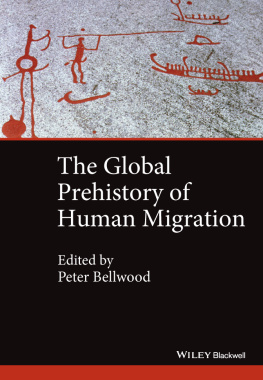Contents
Guide
Pages

Global Futures Series
Mohammed Ayoob, Will the Middle East Implode?
Christopher Coker, Can War be Eliminated?
Howard Davies, Can Financial Markets be Controlled?
Jonathan Fenby, Will China Dominate the 21st Century? 2nd ed
Andrew Gamble, Can the Welfare State Survive?
David Hulme, Should Rich Nations Help the Poor?
Joseph S. Nye Jr., Is the American Century Over?
Tamara Sonn, Is Islam an Enemy of the West?
Dmitri Trenin, Should We Fear Russia?
Jan Zielonka, Is the EU Doomed?
Can We Solve the Migration Crisis?
Jacqueline Bhabha
polity
Copyright Jacqueline Bhabha 2018
The right of Jacqueline Bhabha to be identified as Author of this Work has been asserted in accordance with the UK Copyright, Designs and Patents Act 1988.
First published in 2018 by Polity Press
Polity Press
65 Bridge Street
Cambridge CB2 1UR, UK
Polity Press
101 Station Landing
Suite 300
Medford, MA 02155, USA
All rights reserved. Except for the quotation of short passages for the purpose of criticism and review, no part of this publication may be reproduced, stored in a retrieval system, or transmitted, in any form or by any means, electronic, mechanical, photocopying, recording or otherwise, without the prior permission of the publisher.
ISBN-13: 978-1-5095-1943-9
A catalogue record for this book is available from the British Library.
Library of Congress Cataloging-in-Publication Data
Names: Bhabha, Jacqueline, author.
Title: Can we solve the migration crisis? / Jacqueline Bhabha.
Description: Cambridge, UK ; Medford, MA : Polity Press, 2018. | Series:
Global futures | Includes bibliographical references and index.
Identifiers: LCCN 2017035018 (print) | LCCN 2018000320 (ebook) | ISBN 9781509519439 (Epub) | ISBN 9781509519392 (hardback) | ISBN 9781509519408 (pbk.)
Subjects: LCSH: Emigration and immigration--Social aspects. | Emigration and immigration--Government policy. | Emigration and
immigration--Psychological aspects.
Classification: LCC JV6225 (ebook) | LCC JV6225 .B53 2018 (print) | DDC 325--dc23
LC record available at https://lccn.loc.gov/2017035018
The publisher has used its best endeavours to ensure that the URLs for external websites referred to in this book are correct and active at the time of going to press. However, the publisher has no responsibility for the websites and can make no guarantee that a site will remain live or that the content is or will remain appropriate.
Every effort has been made to trace all copyright holders, but if any have been inadvertently overlooked the publisher will be pleased to include any necessary credits in any subsequent reprint or edition.
For further information on Polity, visit our website: politybooks.com
For my Rafa and Sebas, our future
Acknowledgments
Writing a very short book on a topic one has spent ones whole life working on is no easy endeavor. Communicating ones distilled thoughts cogently and accessibly, without the customary academic toolkit of footnotes and technical language, is, if anything, even more challenging. If I have managed to overcome these hurdles, it is thanks to most generous help along the way: intelligent research assistance and constructive criticism from colleagues, friends, and family.
I am grateful to my students Lauren Windmeyer and Alexandra Lancaster for their assistance, and to Faraaz Mahomed for the unusually fine research support he so consistently provided. Colleagues at the Fletcher LLM Seminar, Princeton, the University of Connecticut, York University in Toronto, the Center for Migration Studies, a Bellagio Seminar on Global Migration Law, and Rutgers have all helped refine my thinking. Courageous migrants and refugees as well as dedicated migration activists working within the UN system and in NGOs on the frontlines of human distress have continued to fuel my strong sense of the urgency to do more and better.
My Harvard colleagues at the Carr Center for Human Rights Policy, the Weatherhead Center for International Affairs, the Graduate School of Education, the Department of Global Health and Populations at the T.H. Chan School of Public Health, and above all the FXB Center for Health and Human Rights offered invaluable feedback on early drafts and inchoate ideas. Close friends and family, including Ana Colbert, Nancy Cott, Michal Safdie, Oliver Strimpel, Homi, Ishan, Satya and Leah Bhabha, provided insights, suggestions, and encouragement without which I would still be lost en route to my destination. Finally, I am indebted to insightful peer reviewers and an exceptionally fine editorial team whose clear vision helped develop my own.
Preface
The rate of contemporary migration is staggering: 24 people are forced to leave their home every minute. The cumulative scale of this global displacement is equally dramatic. At 65.3 million, the population of forcibly displaced people exceeds that of the UK, of Canada, of Argentina, of Australia, and of Kenya. If this displaced population were a nation, it would be the 21st most populous in the world.
Because the modern world is divided up into states with borders and a strong interest in controlling the entry of non-citizens, this large-scale, unregulated migration has become a global political priority of the first order. It continues to dominate both international and domestic agendas. It has severely affected one of the most promising political innovations of the postwar period, denting free movement within the European Union, perhaps irreparably, and unleashing virulent xenophobia across the continent. It has dramatically impacted political leadership, contributing to the precipitous fall of UK prime minister David Cameron, and to the surprising victory of US presidential candidate Donald Trump. And it has altered the political bargaining power of whole countries Turkey most obviously, despite that countrys rapid descent into authoritarian and undemocratic rule. Even the increasingly nationalistic and commercially driven world of global sports has taken note. Setting a world precedent, the standard bearer during the opening ceremony of the 2016 Olympic Games was not a national representative but a refugee, a member of the first ever Refugee Olympic Team.
It is not just the scale and rate of current migration that attract attention, but the wide-ranging, and, until recently, unimaginable responses. In 2014, who would have predicted that Germany would admit more than 1 million asylum seekers, becoming within a year the de facto conscience of Europe? Or that EU member states would erect razor wire fences where free border crossing had been the norm, painfully evoking Europes darkest hour? Or that a single, unforgettable image of a drowned 3-year-old Syrian, with relatives in Canada ready to sponsor him and his family, would lead a guilt-ridden young president to dramatically increase his countrys refugee resettlement figures overnight? Or that a newly elected US president would attempt to legitimate explicit religious discrimination in immigration admissions and bar entry indefinitely to refugees fleeing one of the most murderous civil wars in decades?
Many of these developments have faded from the headlines with the passage of time and the advent of yet more human tragedy and political instability. But it is the apparently irresolvable nature of the refugee and migration problem, and its ramifications for the contemporary geopolitical order, that continue to provoke a sense of anxious panic and drastic reactions among policymakers and voters alike. At the same time, with vicious conflict raging, and dramatic political and economic inequality plainly evident for all to see, migration, however dangerous, presents itself as one of the few available exit strategies for millions. For both sets of affected constituencies, we need to ask: do better alternatives exist and, if so, what are they?

